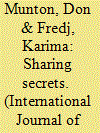| Srl | Item |
| 1 |
ID:
140989


|
|
|
|
|
| Summary/Abstract |
This article leverages normative insights from the dyadic democratic peace literature to assess whether the configuration of regime types within an intelligence alliance can shape the depth of cooperation between its members. The Anglo-Soviet intelligence alliance (1941–45) is considered as an initial plausibility probe of this argument. Evidence is found to support the premise that cooperation between the intelligence services of a democracy and an autocracy is constrained by the absence of the democratic norms of bounded uncertainty and contingent consent. The article concludes with recommendations on how future scholarship can further explore the relationship between regime type and the depth of international intelligence cooperation.
|
|
|
|
|
|
|
|
|
|
|
|
|
|
|
|
| 2 |
ID:
116167


|
|
|
|
|
| Publication |
2012.
|
| Summary/Abstract |
The UK government has accepted the case for strengthening the oversight of the security and intelligence agencies in its 2011 Green Paper on Justice and Security and in the draft Justice and Security Bill 2012. While welcome these proposals are, however, seriously deficient in neglecting the potential contribution of oversight to the protection of human rights. This article argues that democratic oversight should play a significant role in strengthening the protection of human rights by way of audit of policies and review of operations of the agencies, with regard to international intelligence cooperation and where the storage and use of personal data by the services is concerned.
|
|
|
|
|
|
|
|
|
|
|
|
|
|
|
|
| 3 |
ID:
124000


|
|
|
|
|
| Publication |
2013.
|
| Summary/Abstract |
During the lead-up to the 2003 invasion of Iraq, the governments of the United States and United Kingdom jointly made public a range of previously secret intelligence to bolster claims that Saddam Hussein's regime had continued to pursue development of weapons of mass destruction. Public releases of intelligence information are less rare than often assumed, but the Iraq case was definitely unusual in that both governments implicitly revealed their close cooperation.
|
|
|
|
|
|
|
|
|
|
|
|
|
|
|
|
| 4 |
ID:
191880


|
|
|
|
|
| Summary/Abstract |
International cooperation between intelligence services poses a dilemma. It is an important tool in countering today’s complex transnational threats, but at the same time, cooperation is a risky business. Intelligence services can never be sure that a partner will reciprocate in kind. Scholars and practitioners often identify trust as one of the foremost conditions to overcome this dilemma. Yet the notion of trust is seldomly conceptualized in these rational-calculative explanations. Contrary to the common view that intelligence services are exceptional in their opportunism and rivalry, social relations and trustworthiness perceptions provide a more dominant explanation for the level of cooperation between intelligence partners than is often assumed by scholars and practitioners. Known reputations, recognized professional standards, and shared traits socially bind intelligence professionals to their community of practice, enabling them to bridge divides like nationality and even conflicting interests. Intelligence services resemble many other organizations in the public and private domains, requiring a de-exceptionalization of their international cooperation.
|
|
|
|
|
|
|
|
|
|
|
|
|
|
|
|